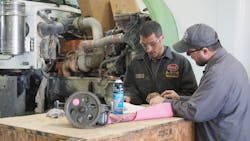Fleet maintenance is a tough job, especially when problems arise. As a director of maintenance or a shop manager, it’s easy to feel like you have a target on your back.
In addition, you are constantly bombarded with operational challenges, equipment campaigns, recruiting, retention, training, resource shortages, the list goes on-and-on.
The good news is that networking with vendors, peers, professional organizations and technical schools can make your life easier. The sooner you develop a network, the more it can help you avoid learning things the hard way.
But networks don’t just happen. You have to actively pursue them. It is also important to remember that the size and composition of your network depends on your needs. It can be small, like some fleets in a local community, or it can be fleets of similar size to yours located across the country.
If you are not sure where to begin or who to include in your network, consider some of the following options.
- OEMs: From Day 1, make sure that if you buy a piece of equipment that you also have the proper tooling, software and training to support it. Develop a rapport with a variety of people at the dealership from the salesperson to the parts manager, parts counter people and service staff. You can set up something as formal as a monthly call or just try to touch base with them on a quarterly basis.
- Peers: Look for other fleets that operate in your space and build a relationship with them. Meet with them every now and then to share ideas and to talk about experiences (good and bad). If they need assistance, offer to help. Networking with peers can be a little tricky because you don’t want to share information that gives you a competitive advantage and nothing will spoil a relationship like stealing their best people.
- Professional organizations and conferences: The Technology & Maintenance Council, state trucking associations and the like are great places to network. These organizations often have educational content that will help you understand industry issues and trends and will keep you up-to-date on the latest technological developments.
- Local technical schools: Developing a relationship with the local vo-tech or trade school allows you to provide real world guidance and input into their programs and that means students coming out of those programs are better equipped to work in your shop.
One of the most important things to remember about networking is that it is a two-way street. You need to be willing to share your expertise and experiences to help others in your network, just as they must be willing to share theirs.
About the Author
Joseph Evangelist
Joseph Evangelist previously served as EVP for Transervice, president of LLT International Inc., and CEO of Lend Lease Trucks Inc. Evangelist is a seasoned transportation executive with domestic and international experience in sales, operations, mergers, and acquisitions.
